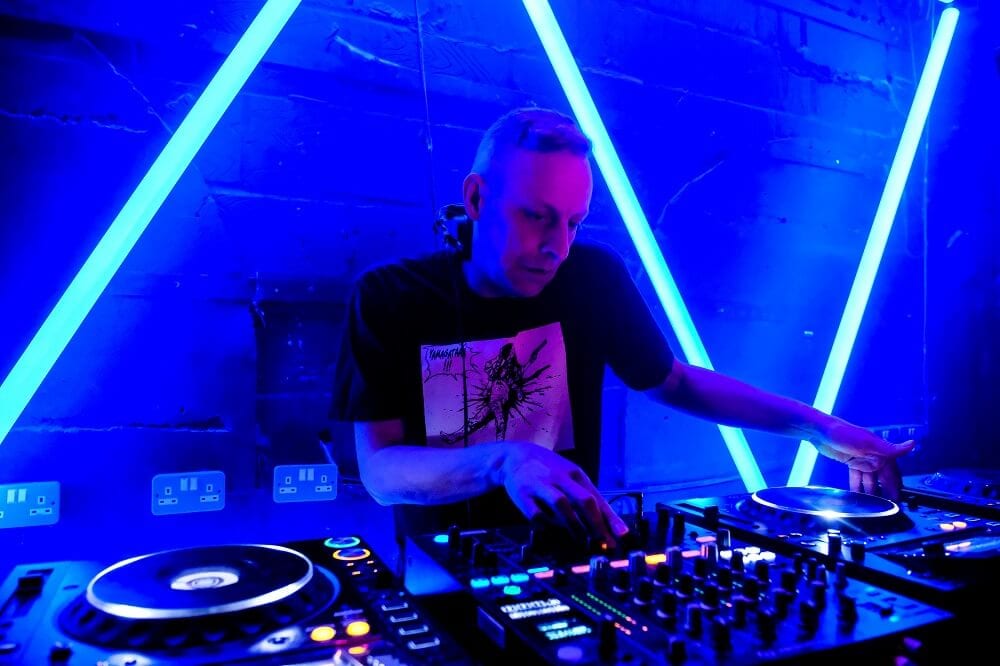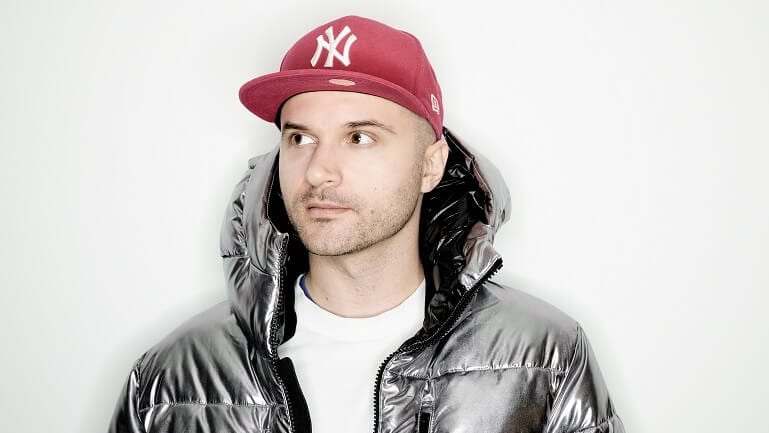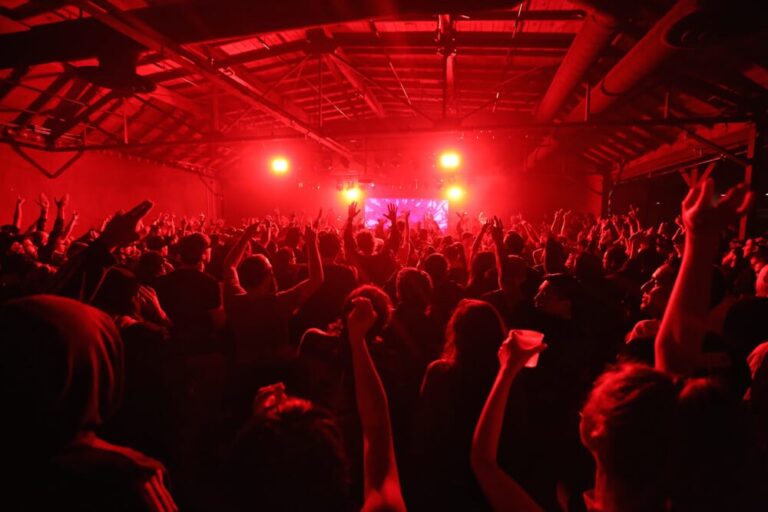Photography: Jake Osman
The craft of the resident DJ is a dark art. Being able to fit any slot of the night, between any style of DJs and bring the vibe of the night together seamlessly is a responsibility of high dot-joining calibre. It’s a responsibility that DJ Lee has relished since his most formative chapters and it’s shaped his sound, his style and his perspective on rave culture ever since.
Studying the music on the frontline at Reading’s famous Basement Records (a thriving hub for early jungle that spawned a whole zoo oflabels, a community of artists and a distribution company), Lee broke through as a resident at key west country rave den Brunel Rooms in the early 90s before moving on to become resident at two of the most important weeklies in drum & bass history: Fabio & LTJ Bukem’s Speed and the Metalheadz Sunday Sessions at Blue Note.
While he’s also known for his label, the early international D&B-supporting label Atlas, and his occasional (but always well received) releases such as the evergreen Headz anthem Tuning, it’s the two residencies that have sculpted and galvanised Lee’s career the most. They set a reputation as one of the scene’s undisputed ‘DJ’s DJs’ which still exists today even though for a good eight years away from D&B exploring techno (as a producer, DJ and dedicated Berghain raver)
During this sabbatical, DJ Lee only played a small amount of drum & bass sets; Metalheadz history sessions and vital London mid-weekly Soul In Motion who have now announced him as their resident. Running point with founders and fellow residents Bailey and Need For Mirrors, Lee will be on rotation at all Soul In Motion events including the event’s sixth birthday tomorrow, Weds March 4, at Orange Yard, London.
We called him up to talk about Speed, Blue Note, techno and the dark art of the resident…
You’ve been on this since day one but there have been quite a few years spent exploring the techno wilderness haven’t there?
Yeah. I DJ’d from the 90s through to about 2009 and my gigs started to drop off a bit. I wasn’t really feeling the music as much at that time and started getting into other things to inspire me and yeah, I flipped into techno. Me and Marcus did some tunes together, he was playing Berghain a lot. My mate Martyn was resident and I was going out just raving. It almost was like 1991 again for me. That place is another dimension. It’s dance music as it should be done. Every DJ plays a minimum of four hours.
Loads of room to go in deep and do something special
Exactly. I’ve seen DJs sink badly in there because they’ve gone in and they’ve tried to impress people or got big egos or something and it just crashes. You’ve got to go through the motions, you can’t just smash the pants off it. That was really inspiring and just what I needed.
The start of a new raving chapter for you, too. You must have been late 30s round then?
Yeah around that. It gave me that going out second wind. People peter-out don’t they? When that first buzz off the music goes, they can either dig around and find something new or be like ‘ah I’m too old for this, I can’t go out.’ But you can and it’s sick. And especially at somewhere like that. It made me think about how I DJ.
This is what I love about the dancefloor. You have no clue what lives your dancing companions lead. Everyone in Berghain on those nights would have no idea there’s a OG drum & bass DJ in their midst, lost on the dancefloor!
That’s exactly what it was and I loved that. But more people would recognise me than I thought. Guys like Ben UFO, Paul Woolford. A lot of techno DJs came from drum and bass as the first electronic music they first got into. It was good to meet those people. But being a punter, being out there, just lost in the music like you said, it’s important. Who does that now? It’s good to know what it’s like to be on the dancefloor. Some DJs forget that. Most DJs started from going out and still doing that is an important part of things for me. It means you’re not cutting youself off.
And it helps you as a resident I’d imagine?
Oh definitely. I spent all my formative years either on the dancefloor or playing residencies. It’s a lost art. You can’t let your ego get in the way, you have to fit into that bit of the night and make a flow of the night. You might play early, late or in the middle but you have to fit in and you have know how the club works at those times and what the people want to hear.
Take us back to Speed…
This was the time when the whole jungle thing was picking up and we were playing a different sound to that so we wanted somewhere to hear it and play it. To be honest it was limited roster because not a lot of people played that stuff. Fabio and Bukem were the two main guys, residents were myself, Doc Scott and Kemistry & Storm. We’d all alternate for most the time. There were so many different sounds and things going on. You had the whole jungle thing happening. There was still a lot of hardcore and rave stuff and then this deeper sound. People called it intelligent.
That phrase hasn’t aged well has it?
No it hasn’t. Who makes up these fucking names though? I’ve heard lots of stories of how the term jungle came about but I don’t know who came up with this one. It was never meant as it ended up being perceived. I guess it was atmospheric stuff, deeper stuff.
Quite techno influenced
100%! We were sampling the techno records. Photek was. Source Direct was. Back then no one could afford the synths so we’d sample them off the records. Actually, you know my tune Wax’d on Metalheadz? It was a kinda homage to Wax Doctor but also a hidden joke. He took loads of my techno records to sample and he never gave them back. A couple of boxes of really sick techno records.
You never got them back?
No! These things happen I guess. But things were very techno influenced and Detroit influenced especially as we moved from Speed to Blue Note. They kinda blended into each other. The first few times I played down there I started playing harder stuff but it was always mixed with the atmospheric stuff. But it did get harder. The label No U-Turn played a massive role in that. Everything was just moving so quickly. All these changes happened so fast, all these different sounds and styles and these nights, Speed and Blue Note were at the forefront of it.
I read somewhere that the first 10 nights were quite quiet?
I don’t remember it like that. The second night went off! I think it took a month before things were in full swing but it was nowhere near 10 nights.
Serious records got broken down there didn’t they?
Groove was the master down there. Hands down. He was deep in the jungle thing doing that side of it but then he’d come and play a completely different thing in Blue Note. He was so far ahead with things. Scotty, too. There were loads of moments of them breaking tunes. That second night Groove played all the No U-Turn stuff and just obliterated it. A classic Scotty moment was when he played a Krust tune. Either Soul In Motion or True Stories. He played it end to end, all 11 minutes of it, and even had a rewind in there somewhere.
Nice. That brings us smoothly to your new residency!
For sure man. Joe (Need For Mirrors) and Michael (Bailey) have got deep roots. They find these amazing venues, I don’t know how but it’s so important for these to happen. Weeklies or regular nights. It’s a place where people can go, hear what’s going on, do some socialising, meet up. Just like the old record shop thing or cutting house thing. It’s so important. It’s an institution now.
It’s their sixth birthday this week. You’ve been a regular down there for a long time, right?
Yeah. They were one of the ones who’d book me even when I wasn’t playing drum & bass that much. Maybe a few times a year. They’ve played a big role in me coming back into the music and me reconnecting with people or making new friends and hearing new people. They’ve been very supportive. Not just me, they do that with everyone. Look at the line-ups, they’re across the board, they’re nurturing the scene. It’s great to be part of.
And it’s your role as a resident to complement everyone in that range of artists…
Totally, but I’m about that anyway. Whatever the night or line-up, I’ll look at my set time, see who’s on before me and who’s on after and think about the best links I can make. It’s not just about me stood there smashing it out, it’s about people going out and having a great night and bridging that gap, taking it up or down. That’s the artform of DJing isn’t it? For me the idea of that smooth journey of the night is too important to play any other way. I don’t want to make it about me. I let the music breathe and layer things more. My favourite DJs do that, and being a resident at a night it gives you more of an impetus to do that instead of just going on and smashing it.
A lot of DJs who do that have come through via their productions and have gone in straight to the peak slots…
Yeah definitely, they’re thrust in there at the top. It’s very different to the ladder we climbed back in the day when you could make a living off either making music or DJing. Are there even any just pure producers? Can you think of any who don’t DJ at all? I don’t think there are any who just make a living off the music. Just DJing alone has financial pressures, that’s why I went back into work. It gives you a balance.
On a positive flip, do you appreciate playing gigs more now you have another life in another professional capacity?
Oh I’ve loved DJing from day one. I’ve never not appreciated it. From the moment I play that first tune all the shit just goes away. It’s complete escapism. But the rise in bookings weirds me a bit. I didn’t think anyone was interested in what I was doing. That’s why I stopped. I did tunes but nothing would come from them. In fact I’d usually get less bookings whenever I released a tune.
Yeah, in 2010, the year you pretty much left D&B, you did a track with S.P.Y and Total Science…
We did and I had some Headz tunes just before. They were slow burners. I still hear the Tuning remix get played a lot now.
Tell me about Atlas, your label. That was early in the whole international side of the movement.
Yeah man. Around that time D&B was still very London/Bristol/UK music. But through travelling to shows abroad I could see there was potential in other places. Hence Atlas, hence all releases from people who weren’t from the UK, bar myself. That was the concept. It felt like that was going to happen whether the UK wanted it to or not, this music was too big for one country. It was exciting. There was Hungarian guy, Anorganik, there was Karl K from America. Obviously DKay…
You’ve done your biggest tracks with him, including Raged last year on 31…
I’ve worked with a lot of people and he’s the one I’ve worked the most closely with. We just click. We did those tunes recently and that was a 10-year gap.
How did that come about?
He’d been doing his thing, different music and projects and just hit me up out of the blue. He saw I’d been DJing and he’d had a great time making music back in the day so I went over to Vienna and the moment we were in the studio we were off. I found this massive sample bank on an old hard drive so we went back in with the same sounds and vibes we were playing with back then and Interlinked came out of it a few hours later. Then we did Raged the next day. It was so quick and so natural it took us by surprise. We’ve got some other bits and hopefully I’ll be going over again soon.
Reckon we’ll hear more releases from you this year?
There’s definitely potential. For me my rule is that if I can have a release out every two years then I’m happy. At the moment I feel like I’ve got a lot of ideas so maybe it’ll be more frequent than that. Plus I have this residency now so I should really make more tunes to play…
DJ Lee will be at Soul In Motion’s sixth birthday, The Orange Yard, March 4
Soul In Motion will also celebrate their birthday on Sunday March 8 at 93 Feet East
Follow DJ Lee: Facebook / Soundcloud / Twitter


